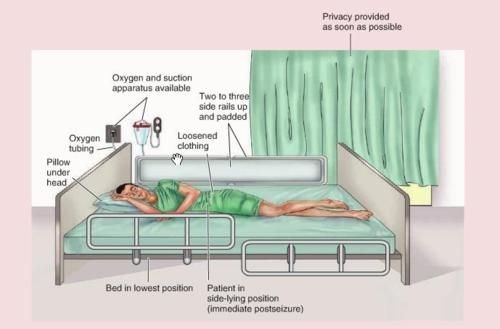A nurse is caring for a client who is in bed and begins experiencing a tonic-clonic seizure.
Which of the following actions should the nurse take?
- Lower the side rails of the bed when the seizure begins.
- Measure the duration of the seizure.
- Restrain the client's arms and legs to prevent injury.
Insert an oral airway into the client's mouth.
Lower the side rails of the bed when the seizure begins.
Measure the duration of the seizure.
Restrain the client's arms and legs to prevent injury.
Insert an oral airway into the client's mouth.
The Correct Answer is B
Lowering the side rails of the bed could lead to the client falling from the bed. Instead raise the side rails and place padding on them.
Measuring the seizure duration is a crucial step for medical evaluation afterwards necessary for determining intervention.
Inserting an oral airway into the client's mouth is not indicated during a tonic-clonic seizure. It is generally not recommended to place any objects or devices into the mouth of a person having a seizure, as it can potentially cause injury to the person or damage to the airway.

Nursing Test Bank
Naxlex Comprehensive Predictor Exams
Related Questions
Correct Answer is C
Explanation
This response allows the nurse to express genuine interest in the client's perspective and opens up a dialogue to understand the client's concerns or reasons for refusing to learn how to self-administer insulin. It provides an opportunity for the client to express their fears, doubts, or any barriers they may have. By actively listening to the client, the nurse can better address their concerns and provide appropriate education and support tailored to their individual needs.
The other options may come across as confrontational, judgmental, or unhelpful in establishing a therapeutic relationship with the client. It is important for the nurse to approach the situation with empathy, respect, and a non-judgmental attitude to foster effective communication and promote the client's engagement in their own care.
Correct Answer is ["C","D","F","G","H"]
Explanation
A.a. Heart rate (98/min): A heart rate of 98/min is within the normal range for adults (60-100 bpm). This does not indicate an immediate need for further evaluation based on the provided data.
B.Blood pressure (112/88 mmHg): The blood pressure reading is within normal limits. This does not suggest an immediate concern.
C. Temperature: The client reports a low-grade fever (38.1°C or 100.5°F), which suggests an ongoing infection or inflammatory process. Further evaluation is necessary.
D.Respiratory complaint: A productive cough with blood-tinged sputum, especially in combination with symptoms such as fatigue, night sweats, and weight loss, is concerning and warrants further evaluation for possible serious conditions such as tuberculosis (TB) or other respiratory infections.
e.Oxygen saturation (98% on room air):The oxygen saturation is normal. This finding does not indicate an immediate need for further evaluation.
F.Weight loss: The client reports a significant weight loss of 26 kg (5 lbs) over the past week. Unintentional weight loss can be a concerning symptom and may indicate an underlying medical condition that requires further investigation.
G.Sputum characteristics: Blood-tinged sputum, especially with other symptoms like cough, fever, and night sweats, can be indicative of serious conditions such as TB or other respiratory infections and needs further evaluation.
H.Travel history: Recent travel to a region where certain infectious diseases are prevalent (such as TB) is a critical factor that requires further evaluation in the context of the client's symptoms.
Whether you are a student looking to ace your exams or a practicing nurse seeking to enhance your expertise , our nursing education contents will empower you with the confidence and competence to make a difference in the lives of patients and become a respected leader in the healthcare field.
Visit Naxlex, invest in your future and unlock endless possibilities with our unparalleled nursing education contents today
Report Wrong Answer on the Current Question
Do you disagree with the answer? If yes, what is your expected answer? Explain.
Kindly be descriptive with the issue you are facing.
